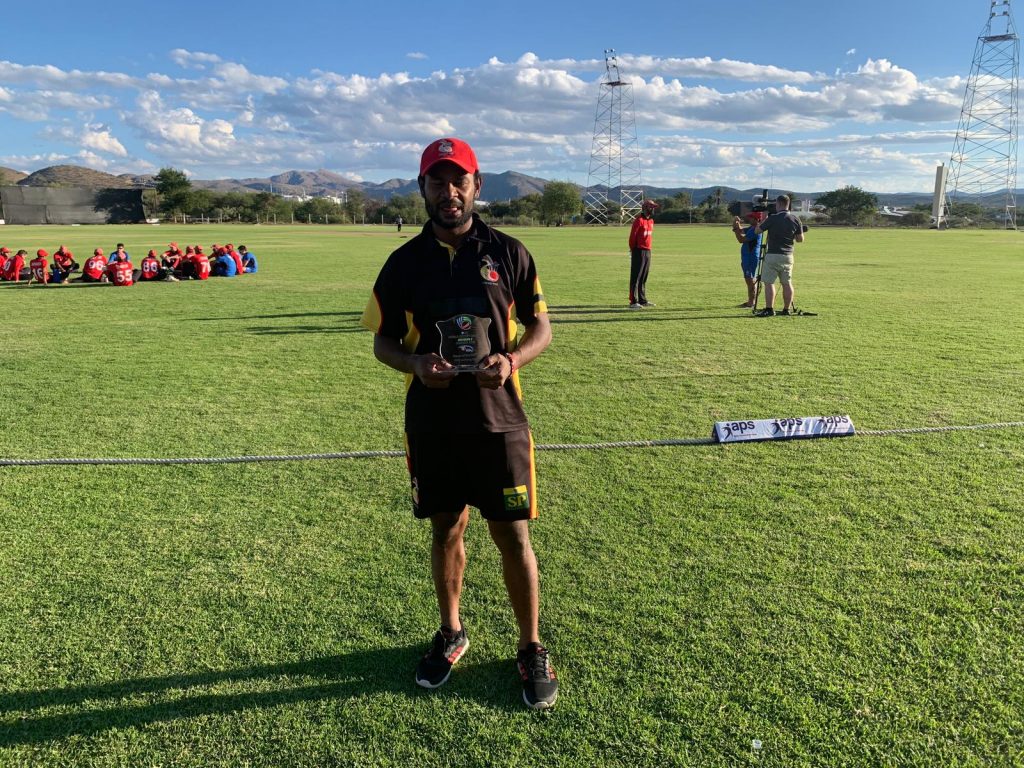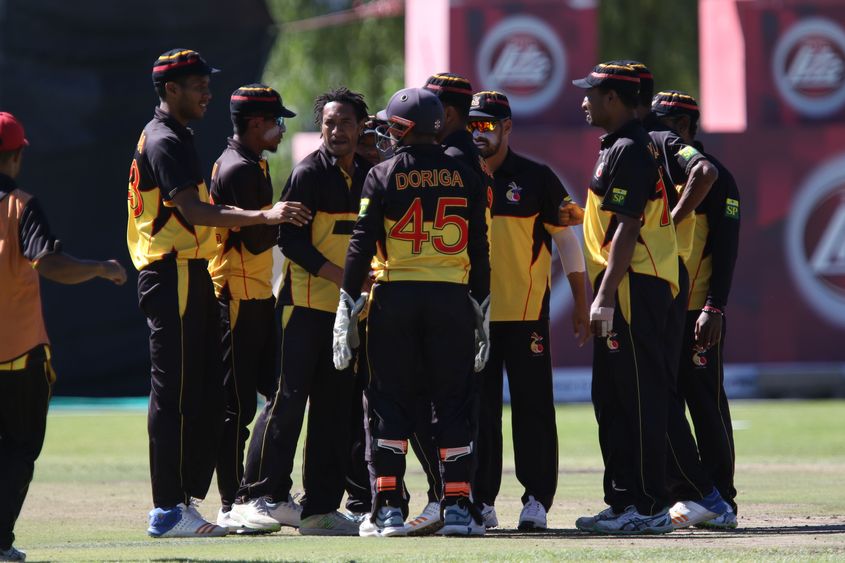April 26, 2019 will forever be the day Papua New Guinea’s Barramundis leapt like salmon.
For all of the pictures of PNG players celebrating their T20 World Cup qualification six months later, it was their celebrations at a Windhoek bar and bistro that are the symbol of a miraculous comeback, never seen in international cricket. As Full Members play bilateral series with little consequence in between global tournaments, Associates fight in a quasi-Hunger Games, playing for a future in the game.
“this is our livelihood, our careers and income on the line”
Papua New Guinea All-rounder Chad Soper.
The last ever World Cricket League tournament, WCL2 in Namibia last year, dangled a carrot in front of its six competitors: four One Day International spots in Cricket World Cup League 2 and nearly a million dollars of funding for each successful team. Crucially, the money and 36 ODI matches for each team was the difference between a career in cricket or going back to other professions to make ends meet.

PNG fell well behind the rest of the field even after their first match at WCL2, losing to the hosts who chased down a target of 119 in 30.3 overs, crippling their net run rate. A victory against Hong Kong in their second match pulled things back, but these gains were lost on day three in a crushing defeat to the USA who reeled in the Barramundis’ paltry 127 in under 20 overs.
PNG’s problems were compounded when taking on Canada. The Barras were bowled out for 154, and the Canadians chased down the target in 34.2 overs. Canada climbed above PNG, with the NRR margin almost big enough to count as an extra win.
WCL2 bottom four before the last day of action
| Position | Team | Points | NRR |
| 3 | Namibia | 4 | 0.923 |
| 4 | Canada | 4 | -0.740 |
| 5 | Hong Kong | 2 | -0.529 |
| 6 | PNG | 2 | -1.512 |
Every team was mathematically alive after day four, though it’s fair to admit PNG needed several combinations and permutations to go their way. Taking on undefeated Oman on their final match, the Barras needed to bowl out their opponents cheaply, either putting up a big total first or chasing down a target as quickly as possible.
The press at the tournament – three members of Emerging Cricket, ESPNCricinfo’s Peter Della Penna, Cricbuzz’s Bertus de Jong and a smattering of local media – had all but ruled out PNG crawling into the top four. Beating an unbeaten team with authority and needing two other results to go their way? Surely it was too much. De Jong, monitoring the net run rate scenario, saw little chance before the last day and spoke on the whole for everybody watching on.
“They’re in a massive net run rate hole and they’ve been a little unfortunate. They were just annihilated by the USA admittedly but what’s hurt them almost as much were the two games against Namibia and against Canada today, where again they got bowled out cheaply,” de Jong acknowledged on the Emerging Cricket Podcast after matchday four.
“The Namibia game was a lot closer than the net run rate sort of accounts for, and again today you feel like they were maybe one or two wickets earlier on from really throwing the Canadians into a panic but the net run rate doesn’t account for wickets down. They’re in a huge hole now to the point where their net run rate situation is irrecoverable. They need to win on Friday (against Oman) and they need to hope that Hong Kong and Canada lose. There’s no other way that they’re getting into the top four.”

On the Thursday night, PNG’s players sat down for their soul-searching.
“When the boys started to open up and they said stuff about what they were going through and why some players weren’t playing the way they were expected to play, that awakened something that was in us,” Norman Vanua told the Emerging Cricket Podcast.
“After that day we all went out for dinner. We went out for dinner every night but that night was just different. We sort of bonded as a group. We didn’t say much but the vibe of the group was way, way better than when we started the tournament.”
PNG’s players awoke to another Windhoek day blessed by sunshine. The team travelled from the hotel to the United Ground, but it’s fair to say the press was instead concentrated on the action at Wanderers and the adjacent Affies Park. Hong Kong and Namibia were set to battle in a shootout to claim one of the spots available, while it was perceived that a Canada win would be enough to claim the other spot. PNG held a team meeting to discuss what it meant to represent their country’s 8.6 million people.
“The senior players in the squad spoke out as well knowing full well that this is our livelihood, our careers and income on the line and that if at least one of us didn’t do our job or support each other, we were not only letting our team mates down but our families and our countrymen past and present down,” all-rounder Chad Soper recalls.
“From a players’ perspective we all knew that it was now or never. Coach (Joe Dawes) was and is brilliant in keeping us level headed in our preparation making sure we all know to focus on what we can control to execute our game plan to get the win, and the rest will be up to results.”
The Barramundis made one change, with Simon Atai, an extra batsman, brought in for Jason Kila. Put into bat, the lack of attention on PNG versus Oman by almost everyone looked vindicated, as PNG slumped to 32-5. None of the top five reached double figures, and the side had gone at just two and over for the first 15 overs.
“They just haven’t been able to put together a complete performance really,” Tim Cutler stated on commentary in regards to PNG reading the progress score, while at Affies Park watching Namibia take on Hong Kong.
“The one game they did win Tony Ura (made) 87 off 101 balls against Hong Kong but beyond that they’ve just not have been able able to put partnerships together.”
Almost listening to the stream, Kipling Doriga and Sese Bau fought to prove everybody wrong. The pair combined in a partnership of 129, and the Barras had an opportunity to post a defendable score over 200. Doriga made 65, with Bau fighting with Norman Vanua and debutant Atai before falling for 80. Soper and his teammates watching on held belief.
“As a batting unit regardless of our situation, we bat all the way to number 11. It was a credit to see Sese and Kipling and the lower order boys accelerate in the final overs to get us past 200 on that wicket and I know for a fact that gave the bowling unit belief that we could go out and do our job.”
Nosaina Pokana came in at number 11, squeezing out six runs for his team as the total reached 221. That six proved to be almost as vital as the bowling display that he was about to unleash.
In the first ball of Oman’s innings, the left-armer struck. Leaving Jatinder Singh’s stumps in a mess, Aqib Ilyas walked out at three, only to walk back to his camp after knicking the next ball to Doriga. Two balls into Oman’s innings, PNG’s belief started to turn into confidence. The Barramundis were not going to roll over and die just yet.
Pokana struck again in the fifth over to put the foot on the throat a little more, though it was the ninth over of the innings, where three wickets fell, that hit things home. Mohammad Nadeem, Jay Odedra and Suraj Kumar all departed, and Oman, now at 25-6, showed none of the characteristics that shot them up the table. PNG skipper Assad Vala threw the ball to Soper, whose metronomic line and length proved to be the final ingredient to an almighty boilover.
“I know my job in the side is to be as consistent as I can be, and coming into that game I was a bit down on my own bowling efforts in previous games so I think I just tapped into what the boys were creating out on the field and locked in on my job.
“I can’t explain it but that belief and atmosphere just overwhelms you as a player, seeing your teammates lift at the fall of each wicket knowing what was on the line was incredible.”
Soper finished with figures of 3-15 from seven overs, PNG ran through the finishing tape and Oman self-destructed to be bowled out for 76, losing by 145 runs.
Oman’s capitulation concluded so quickly that Papua New Guinea could warm down, debrief, and still head to Dros bar and bistro at the ground to watch the stream of Canada’s match. Vala even had time to speak to the ICC Media, discussing their victory well before hearing (or seeing) their fate.
“We gave away some cheap wickets but the boys (Doriga and Bau) fought back in the middle and post 221. We thought, if we bowled well and fielded to our standards, we knew we could cause them problems.”
A crucial part of PNG’s crushing victory was that it caused such a seismic shift in the net run rate, that now a Canada win alone was no longer enough to finish in the top four. As Namibia looked to be in an unassailable position against Hong Kong after putting up 396^, it became a two-horse race between PNG and Canada for the remaining spot. Instead of defending the 255 they made, De Jong worked out that Canada needed to restrict USA to under 212 at Wanderers to claim ODI status, and those responsible for the teams’ data sets worked feverishly to come to the same conclusion.

Word got around fast. PNG players had obvious interest, though to keep up with action on the other side of town, the team had to watch Canada’s quest huddled around streams at the United Ground. The butterflies for Soper and the rest of the PNG squad hung around.
“There is nothing that compares to the immense pressure and anxiety we all experienced that afternoon waiting for that result. We sat there at the ground, arm in arm, watching and praying on three live streams on phones knowing not only the score that was required but also full well that everything was completely out of our control.”
Vanua meanwhile preferred to be in solitude.
“A few boys stuck together. I walked to the other side of the field and sat there by myself and honestly just started praying to god and asked “If there’s a miracle going to happen today, this would be it.””
Seven kilometres up the road at Wanderers, Davy Jacobs, captaining Canada, received a message in the field and was forced to make adjustments to defend a smaller target of 212. PNG’s victory was so large that Jacobs was essentially robbed 43 runs halfway through USA’s chase. Canada’s bowlers caused a late collapse, and the Americans fell from 191-6, to 198-9. With 15 runs to play with and one wicket to take, Jacobs kept slips in place, and had helmets raced out for fielders to crouch around the bat.
Left-arm spinner Saad bin Zafar was deployed, and the Canadians appealed for every half-chance. Any sniff of a wicket was enough to get the eleven Canadians up and about. A Rodrigo Thomas misfield cost Canada crucial runs, as the Americans moved from 206 to 209-9. More men crept in, with fielders almost on the pitch. Two whole minutes passed between the end of the 47th over and the start of the 48th, with meticulous field placement and mulling over tactics from Jacobs and his team. They even had an appeal for obstructing the field, that was turned down by both umpires. Canadian squad members in the high-vis gear, with advice mid-over, were instructed to turn around. The USA, at this point also playing to the new target, were not keen to hand Canada the last spot. On the fourth ball of the last over, Nosthush cut behind point, and the ball trickled into the outfield towards the rope.
“We watched ball by ball for the final hour of the game down to the last over where USA needed 4 runs (for PNG to go fourth) and Canada just needed the last wicket,” Soper continues.
Whether time slowed down, or the ball crawled, it eventually tripped over the rope. Canadian players fell to the floor, two balls before the match ended. Their hard work had been undone by a rampaging PNG, though it was a tenth-wicket USA partnership that was the straw that broke the camel’s back. Fighting the buffering and poor connections of the stream, Soper and his teammates realised a dream.
“Once Kenjige hit that ball through the infield the table was uplifted and the boys were running, crying, hugging in celebration.”
Vanua, on the other side of the ground, learned of the news a fraction later.
“I kept pressing refresh (on the scorecard), refresh and then as soon as I hit refresh the last time it loaded and I saw the score, and I turned around and saw all the boys jump up, I literally stood up from where I was sitting and ran across the field with my hands up and shouted “we’ve done it boys, we’ve done it boys!”
“I was the most anxious time of my life I’d say, I think I grew a couple of white hairs.”
As PNG’s players jumped for joy and Canada’s begged the ground to swallow them, it took a few moments for everyone else to comprehend what just played out. Written off before play, PNG put up 221 and won by 145 runs against an undefeated team, and forced a re-think for another captain, who was halfway through playing in a different game that started at the same time.
“We said they just need to win and they need to hope other results go their way (to go through on points),” de Jong, appearing in the wrap-up Emerging Cricket Podcast that evening, acknowledged.
“Somehow in only half a day Papua New Guinea had gone from absolutely nowhere and out for the count to in the driving seat.”
“They’ve actually done it on net run rate with this, what turned out to be, a colossal victory over Oman.
Ruled out and written off by everyone but themselves, PNG’s fight to claw out of one of the deepest holes in cricket history should never be understated. For all the talk of sport as the best reality television, the Barramundis’ story in Africa is a glowing example that one can experience the emotions of all that drama, and still witness a finish more befitting of a fairytale. It will forever be a reminder to never write off an underdog, and certainly a reminder to never write of the Barramundis.
Keep up with the emerging game through our Facebook and Twitter pages.
Looking for audio content on the emerging game? Add the Emerging Cricket Podcast to your favourites on Apple, Spotify and Podbean.
Want extra Emerging Cricket content? Contribute to the Emerging Cricket Patreon cause from as little as $2 a month. Sign up here!
^Namibia’s 396 was the recorded score, though evidence from the stream suggests the score should have been 398.







